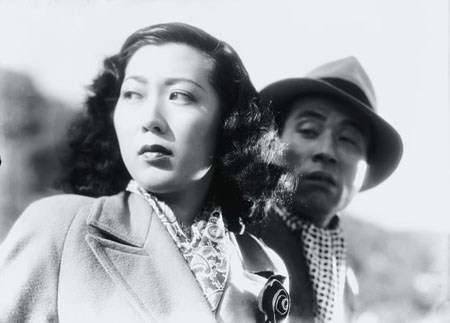Today’s announcement from the Berlin International Film Festival (February 7 through 17) brings two sets of Forum Special Screenings. Newly restored 35mm prints of five films by Keisuke Kinoshita (1912-1998) will be presented in collaboration with Tokyo FILMeX, with six more slated for a retrospective screening at the Arsenal later in February. The five for the fest, with descriptions from Tokyo FILMeX:
Kanko no machi (Jubilation Street, 1944). “A depiction of relationships between residents of a town who decide to stay put as the tide of the war takes a turn for the worse and citizens evacuate to the countryside. Although made as government propaganda, Kinoshita’s sympathies remain with the common people.”
Onna (Woman, 1948). “An ambitious work shot entirely on location that follows a dancing girl as she tries to escape from a persistent rogue and make a new start in life. The sequence in which their duel reaches a climax is breathtaking.”
Konyaku yubiwa (Engagement Ring, 1950). “Melodrama depicting the wife of a man convalescing from illness running his Ginza jewelry store in his stead, while becoming attracted to the young physician in charge of his recovery. Tanaka Kinuyo’s first film upon returning from a period in America.”
Yuyake gumo (Farewell to Dream, 1956). “A young boy, the son of a fishmonger, gives up his dream and determines to continue the family business amid harsh realities, including his father’s death. The young boy’s quiet resignation leaves a subtle impression in this cinematic gem.”
Shito no densetsu (A Legend or Was It?, 1963). “A masterpiece portraying the circumstances of a dispute that occurs when a marriage proposal by a village landload’s son is declined by a family evacuating to Hokkaido during the closing years of the Pacific War.”
And then, four more special screenings, with notes from the Berlinale:
Le cousin Jules by Dominique Benicheti, France 1973. A “milestone in documentary filmmaking. This extremely minimalist film shot in cinemascope and color with stereo sound actually took 6 years of painstaking work to produce, following the ritualized everyday life of an 80-year-old farmer and blacksmith from Burgundy before gradually blossoming into a moving swansong to a bygone era.”
Cheongchun-eui sipjaro (Crossroads of Youth) by Ahn Jong-hwa, Korea 1934. A “melodrama about the adventures of a country boy in the big city of Seoul, is the oldest surviving Korean feature film and the only one by director Ahn Jong-hwa to have been preserved. The end of the Japanese occupation, the division of the country and the devastating war between North and South did as much to destroy film historical heritage as carelessness in the post-war era. What has not been lost, however, are the memories of the art of mise-en-scène, the film narrators called ‘pyeonsa,’ the music and the costumes that all formed part of silent film performances in the 1930s. Taking these memories as his inspiration, director Kim Tae-yong (Late Autumn, Forum 2011) has put together a modernized stage show for the revival of this cinematic gem complete with orchestra, narrator and singers, which is now coming to Berlin thanks to the generous support of the Korean Film Council and the Busan Film Festival.”
Kya hua is shahar ko? (What Happened to This City?) by Deepa Dhanraj, India 1986. “The riots between Hindus and Muslims in 1984 form the starting point for this film of immense political power, which analyses the mechanisms of political power struggles as well as the instrumentalization of economic conditions and municipal poverty.”
Portrait of Jason by Shirley Clarke, USA 1967. “It is thanks to the untiring research and restoration work carried out by American distributor Milestone Films that Clarke’s Portrait of Jason can now be screened as an additional revival. In the director’s own room at the Chelsea Hotel, an Afro-American hustler called Jason Holiday talks of the different roles he plays in life: male prostitute, housemaid, con-artist, worker at a graveyard for dogs and nightclub entertainer. In the process, this provocative film questions our ideas of identity and truth.”
More on the 2013 lineups: Sundance (rounds 1, 2, 3, 4, 5) and Slamdance, Rotterdam (rounds 1, 2, 3, 4, 5, 6) and Berlin (rounds 1, 2, 3, 4, 5, 6, 7, 8, 9, 10), and SXSW (round 1).
For news and tips throughout the day every day, follow @KeyframeDaily on Twitter and/or the RSS feed. Get Keyframe Daily in your inbox by signing in at fandor.com/daily.




